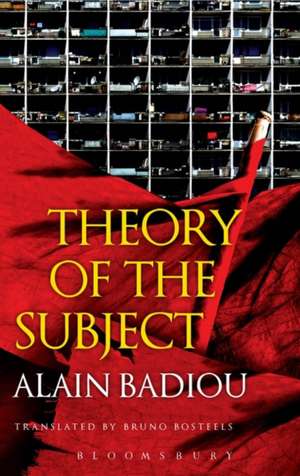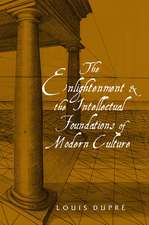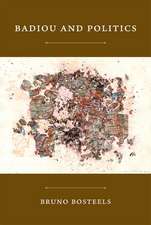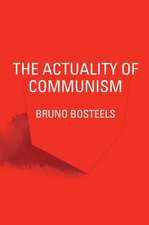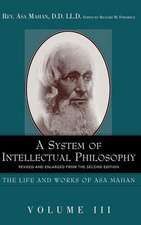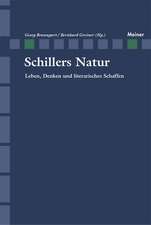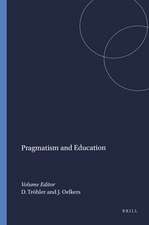Theory of the Subject
Autor Alain Badiou Traducere de Bruno Bosteelsen Limba Engleză Paperback – 13 feb 2013
| Toate formatele și edițiile | Preț | Express |
|---|---|---|
| Paperback (1) | 127.52 lei 6-8 săpt. | |
| Bloomsbury Publishing – 13 feb 2013 | 127.52 lei 6-8 săpt. | |
| Hardback (1) | 251.44 lei 6-8 săpt. | |
| Bloomsbury Publishing – 27 mai 2009 | 251.44 lei 6-8 săpt. |
Preț: 127.52 lei
Preț vechi: 207.95 lei
-39% Nou
Puncte Express: 191
Preț estimativ în valută:
24.40€ • 25.54$ • 20.19£
24.40€ • 25.54$ • 20.19£
Carte tipărită la comandă
Livrare economică 05-19 aprilie
Preluare comenzi: 021 569.72.76
Specificații
ISBN-13: 9781441159595
ISBN-10: 1441159592
Pagini: 416
Dimensiuni: 129 x 198 x 36 mm
Greutate: 0.43 kg
Editura: Bloomsbury Publishing
Colecția Bloomsbury Academic
Locul publicării:London, United Kingdom
ISBN-10: 1441159592
Pagini: 416
Dimensiuni: 129 x 198 x 36 mm
Greutate: 0.43 kg
Editura: Bloomsbury Publishing
Colecția Bloomsbury Academic
Locul publicării:London, United Kingdom
Caracteristici
Theory of the Subject is one of his most significant and influential works. Slavoj Zizek calls it "a true philosophical classic."
Notă biografică
Alain Badiou teaches at the École Normale Supérieure and at the Collège International de Philosophie in Paris, France. In addition to several novels, plays and political essays, he has published a number of major philosophical works.Bruno Bosteels is Associate Professor of Romance Studies and Comparative Literature at Cornell University, USA, and author of Badiou and Politics (Forthcoming, Duke University Press).
Cuprins
Translator's Introduction \ Author's Preface to the English translation \ Preface to the French edition \ 1. The Place of the Subjective \ 2. The Subject under the Signifiers of Exception \ 3. Lack and Destruction \ 4. A Materialist Reversal of Materialism \ 5. Subjectivation and Subjective Proces \ 6. Topologies of Ethics \ Thematic Index \ Name Index
Recenzii
A rare achievement, a true philosophical classic, comparable to only two or three books in the twentieth century, such as Heidegger's Being and Time. The difference is that, if Being and Time left its mark on twentieth-century thought, Theory of the Subject announces the thought of the twenty-first century. It opens up the path that Badiou followed in his two later classics, Being and Event and Logics of Worlds, but it enforces this opening with a violent freshness which far surpasses its later developments. So beware, reader: when you open this book, you hold in your hands proof that philosophers of the status of Plato, Hegel and Heidegger are still walking around today!
Theory of the Subject is the first of Badiou's three great philosophical works, along with Being and Event and Logics of Worlds. It is his most passionate, most uncompromising and most revolutionary book. Bruno Bosteels has long been its most ardent and eloquent reader, and he is the ideal person to present and translate this challenging text.
Theory of the Subject, impeccably translated by Bruno Bosteels, stands as one of the most successful attempts to integrate a psychoanalytic appreciation of subjectivity with the demands of revolutionary politics, and for that alone, and for its signal importance in the broader sweep of Badiou's philosophical project, it remains necessary reading.
Theory of the Subject is a fulminant, challenging and intellectually rewarding book well worth reading for the sake of its rich language and philosophical references.
Reviewed in The European Legacy, Vol. 16, No. 4
Theory of the Subject is the first of Badiou's three great philosophical works, along with Being and Event and Logics of Worlds. It is his most passionate, most uncompromising and most revolutionary book. Bruno Bosteels has long been its most ardent and eloquent reader, and he is the ideal person to present and translate this challenging text.
Theory of the Subject, impeccably translated by Bruno Bosteels, stands as one of the most successful attempts to integrate a psychoanalytic appreciation of subjectivity with the demands of revolutionary politics, and for that alone, and for its signal importance in the broader sweep of Badiou's philosophical project, it remains necessary reading.
Theory of the Subject is a fulminant, challenging and intellectually rewarding book well worth reading for the sake of its rich language and philosophical references.
Reviewed in The European Legacy, Vol. 16, No. 4
